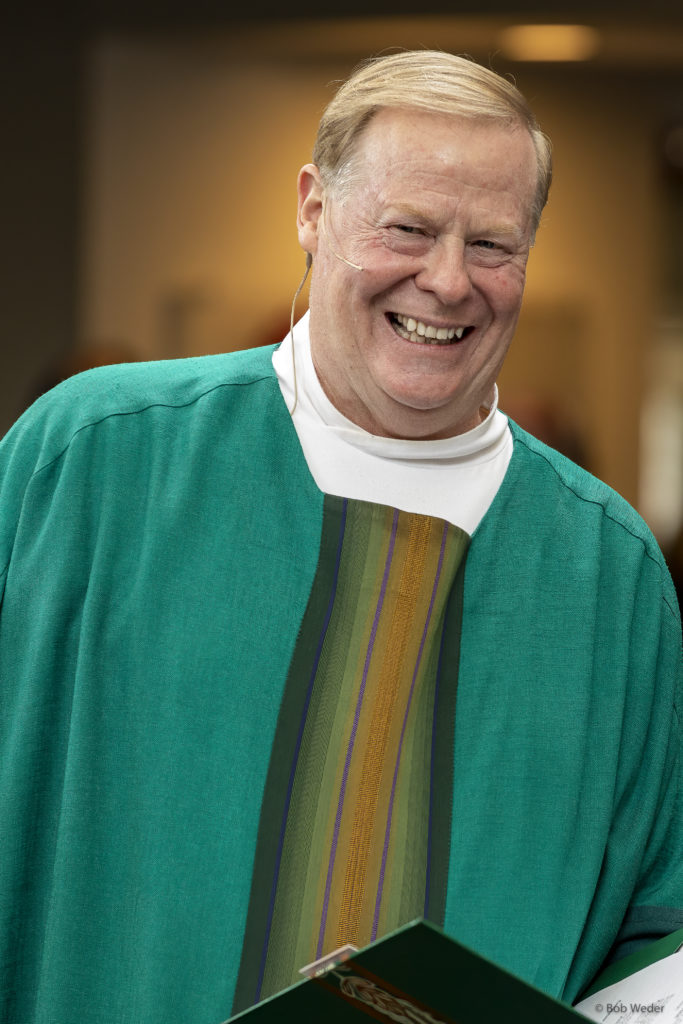
I had the honor of preaching at all Masses last weekend and drawing your attention to our annual stewardship report. We are required by the Archdiocese to present our fiscal finances to all of you each year. This year we presented a more thorough report, including statistics and short narratives that tell a bigger story about what we have done in the last year and where we stand financially. I hope that you took a copy of the beautiful report and, if not, they are still available in the Narthex. Please take one for more important information about our Holy Family.
These days I am likening stewardship in life, and consequently in the church, as caring for good wine. Wine stewards care for wine in order to maximize its taste, but it begins with God. God gives vines, grapes, soil, sunlight, rain, sun; and then humans take over with harvesting, crushing, fermenting, bottling, storing, serving and finally – tasting. I liken Holy Family to a really good bottle of wine, and stewardship of our community is much the same.
First of all, stewardship of our community starts with God and the blessings that God has given us. God entrusts us with gifts, and we are all called to care for those gifts in a way that maximizes our taste, our potential, our mission.
Stewardship means making more of what God has entrusted to us and, as a really good bottle of wine, it takes a lot to take what God gives us and make it not simply good, but really good. Many of us taste the result, but not nearly as many realize or participate in the process of making the quality of that taste.
Stewardship calls us ALL to be caring, diligent, compassionate, attentive, understanding and more, as key components to the process of making the good wine. Stewardship calls us to do this TOGETHER. Stewardship also calls us to taste, enjoy and be inspired by the end result – the product – TOGETHER. Stewardship calls us to BOTH care for and enjoy – TOGETHER!
Let’s open the bottle, let the spirit of Holy Family breathe to maximize its taste so that many may enjoy its taste. Let’s be a part of the process as well as the product as stewards of our amazing community. Let’s capitalize on God’s start, let’s take over and care for and, ultimately, taste the really good wine of Holy Family – together.
This weekend…
We hear another parable about prayer this weekend from Luke’s Gospel. A Pharisee (Jewish religious leader of the time) and a tax collector (the epitome of Roman, Pagan greed) offer two very different forms of prayer. The Pharisee is the height of religiosity and associates his prayer with obedience to rules. The text offers a real clue as to his misdirected prayer. It says, “The Pharisee offered this prayer TO HIMSELF.” Obviously prayer should go to God. It should not be a recital of what we have done. God already knows that. It should not be comparative, as the Pharisee does with the tax collector. It should not be self-centered. Such approaches scream of being disingenuous
The tax collector on the other hand is very genuine in his prayer. He is more God focused, sincere and humble. Jesus picks up on this aspect of the tax collector’s prayer and proceeds to make a statement of comparison between exalting self and humbling self.
How do you pray? What is prayer to you? How do you define prayer? I have used a definition of prayer from one our young parishioners, Jillian Byers, for some time now. When she was in third grade during an Academy Mass, when I asked for a definition of prayer, Jillian answered, “Prayer is when God listens to us.” Jillian is now preparing for the Sacrament of Confirmation and I reminded her of her definition recently during one of our Pizza with the Pastor gatherings that I hold with all teens preparing for Confirmation.
Jillian’s definition matches the action of the tax collector. It starts with God. Try starting each of your prayers by raising your consciousness of God listening to you. It might change the way you pray. That is an exercise in humility.
Jesus emphasizes genuine humility as a virtue. What is genuine humility? It is more than demeaning ourselves. Genuine humility means realizing our place in any process or relationship. When humility is genuine, we don’t simply put ourselves down, but we know our right place. In all fairness, perhaps the Pharisee was not taught humility. Perhaps he was taught that obedience to the letter of the law was more important. Humility is a perspective. The tax collector needed mercy, and he turned to the ultimate source of mercy. Try using contemplation, meditation and consideration, particularly with a pierce of scripture, to heighten your prayer experience.
Sue Geegan recently visited Mississippi with Catholic Extension Society and recalls the consistent prayer of immigrants that have benefitted from our Holy Family Fund from this year’s Lenten Social Justice Project. She found the immigrants consistently pray one prayer to God in the midst of their confusion, isolation and desperation. They, like the tax collector in the Gospel, offer a simple prayer: “God help me to embrace and understand your will.” This prayer, they believe will lead them to understand their purpose here.
I have found myself praying in the same way. In fact, I believe that to understand and embrace God’s will is the ONLY prayer. Lord help us to understand your will and to carry it out.

